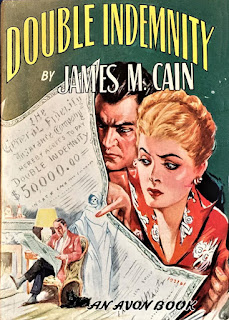James M. Cain is one of those great mystery/suspense writers that everyone interested in good writing should read. The problem is that film versions of two of the novels were made into Hollywood films that are so popular they have overshadowed their sources. As our guest, Richard Brewer, put it in the podcast, "Well, I've seen the movies, so I feel like I've read the books". I think a lot of readers think this way which is why Cain has been neglected as an author compared to Hammett, Chandler, and Ross MacDonald.
This podcast tries to bring attention to this wonderful, stylish author: his life, the paperback reprints of his novels, and a discussion of what I consider to be his masterpiece, Double Indemnity. The first half of the podcast is the biography and paperback publishing history (in general). And the second half is a discussion with our favorite guest, Richard Brewer. Richard appeared in Ep 3 & 7 (Chandler and Cain) and so we brought him back to discuss James M. Cain.
James M. Cain
SHOW NOTES
The music for this podcast is from archive.org and is in the public domain. The opera solo is from Verdi's La Traviata, a French recording (1920?) sung warmly by Arthur Endreze.
Biographical and critical information for this podcast came primarily from Roy Hoopes's definitive biography, Cain: The Biography of James M. Cain (1987). The paperback publishing history came primarily from research in the wonderful Jon Warren's The Official Price Guide to Paperbacks, an essential guide for anyone who wants to learn/research the history and publishing of paperbacks. The actual price guide element in the book is long out of date though.
Surprisingly, the James M. Cain wikipdedia entry is quite well written and informative. You can find a complete bibliography and reviews at the excellent mysteryfile.com website. The IMDB has a full listing of film/TV adaptations of his works.
Avon paperback (1945) Cover by Paul Stahr
COLLECTING JAMES M. CAIN IN PAPERBACK
In the podcast, I trace the history of James M. Cain in paperback or at least the first 20 or so years of paperback publication. The Armed Service Editions (ARC) were the first paperbacks published (I don't count magazines or digests as paperbacks) followed by AVON editions which are probably the most collectible. Penguin, before they split off into Signet/New American Libray, published some early works. The Signet editions are awfully nice and I think they are the best to collect since they are readily available and not as pricey as the AVON paperbacks. Pocket Books did some lovely editions with great cover art, although James Avati created a cover for Serenade for Signet which is fantastic. There is a nice collection of James M. Cain covers on Pinterest. SIGNET paperback (1950) Cover by James Avati
I personally like the vintage (Random House) editions of the 1970s with their photographic covers. The current paperbacks (quality paperback size) use graphics instead of noir photos. These editions make for excellent reading copies. You can frequently find a collection of Cain's paperbacks for sale on
eBay or Etsy, but patience and regular visits to your local used bookstore will result in a good collection of Cain's works.
 |
| Vintage 1978 paperback cover |
Later novels are easy to find, but not in paperback. Some never had paperback reprints. Plus, they can be pricey even though they really shouldn't be.
I highly recommend Sixy Years of Journalism by James M. Cain (edited by Roy Hoopes). His newspaper essays are writing are so very funny. Read the essay on Southern California and you'll be laughing your ass off. This is a side of Cain that is not nearly as well known as it should be.
SPECIAL GUEST RICHARD BREWER
My co-host on this episode is a long-time mystery reader. We first met while working at the Mysterious Bookshops back in the 90s. He is also an audiobook director having recently completed the novels of Raymond Chandler as audiobooks. Check out his Facebook page. The Chandler audiobooks (narrated by Scott Brick) can be found here.
Richard mentioned the Raymond Chandler series he directed for Audible. You can find those recordings here. He recently finished narrating a Bart Hall western-noir book for Audible called Under Tower Peak. The anthology Culprits: The Heist Was Only the Beginning that Richard and Gary Phillips edited can be found here.




